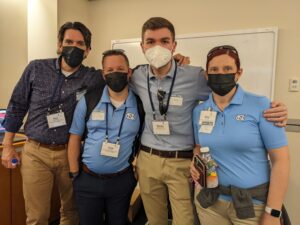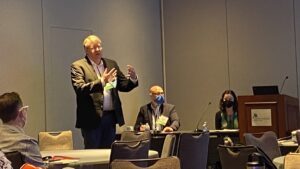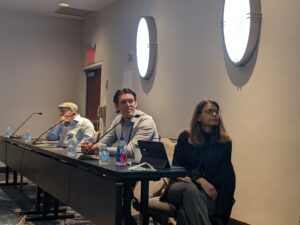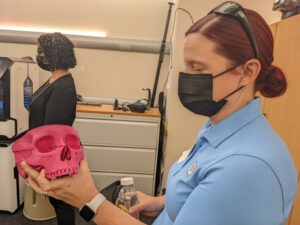The AAMC Conference, sponsored by the Group on Information Resources, took place in NYC June 1-3 and was attended by nine members of School of Medicine IT. IT colleagues presented on wide-ranging topics from research to academic and medical education technologies and had an opportunity to network and collaborate with colleagues from esteemed schools across the U.S. and Canada.

Nine of UNC School of Medicine’s IT professionals attended the 2022 Information Technology in Academic Medicine Conference sponsored by the Group on Information Resources in New York City June 1-3. They joined hundreds of other CIOs, technology directors, librarians, data innovators, as well as a host of other academic medical IT specialists for three intensive days of sessions.
“It is IT folks in Medical Health Affairs from schools across the country,” explains Sten Swenson, Director of Academic Technology Services, adding “It is by far the most valuable professional community I’ve ever been a part of.” Ken Langley, Director of Research IT agrees. “It’s a great opportunity to meet, connect, and learn from other really smart colleagues – collaborating and building connections to help solve the problems that we encounter.”
The conference began with a tour of NYU Grossman School of Medicine and included visits to several areas on NYU Langone main campus including lecture halls, seminar rooms, the NYU Sid and Ruth Lapidus Health Sciences Library, the new state-of-the-art Science Building, and the New York Simulation Center in Bellevue Hospital. Attendees also had a chance to meet with and ask questions of Dr. Marc Triola, Associate Dean for Educational Informatics at NYU Langone Health (who was also a plenary speaker at the conference). Dr. Triola shared his vision of “precision education,” using AI tools to personalize medical education for each unique learner in specialized and efficient ways.

During the conference, UNC attendees had opportunities to learn and network with peers, and they presented on a variety of topics in collaboration with colleagues from sister institutions across the country. Charles Thayer, Infrastructure Support Analyst, and Ken Langley, alongside speakers from Weill Cornell Medicine and Harvard Medical School, shared their perspectives from early and middle stages of development of a research data management program. They described the successes and challenges related to their experiences in policy and procedure development, researcher buy-in, and opportunities for optimizing storage solutions for cost efficiency, computation, and the sharing of research data.

Amy Cole and Sten Swenson presented viewpoints and lessons learned on training users of enterprise digital solutions, which they did in coordination with speakers from Icahn School of Medicine at Mount Sinai and NYU Langone Health. When asked what it was like collaborating with professionals from these respected institutions, Amy Cole, Project Manager at SOM IT says, “we have so many things in common, including our challenges. It’s been insightful hearing the stories and understanding the maturity level of other schools and getting to know them on a professional and personal level.”
Evan Marsh, Student Systems Manager, alongside professionals from Stanford Medicine, Washington State University, Albert Einstein College of Medicine, and UCI School of Medicine, presented on the topic Making It Work; Support Strategies for Small Staffs in Times of Turnover. Evan went on to co-lead yet another presentation with Wesley Leonhardt, Student Systems Analyst, sharing UNC School of Medicine’s successes and challenges with implementing a medical student iPad program in tandem with speakers from UC San Diego School of Medicine, Washington State University Elson S. Floyd Collage of Medicine, and UC Irvine School of Medicine. “Our presentation focused on implementing tablets, and key data points from our technology survey, highlighting student feedback,” says Wesley, adding that “it was awesome to hear other institutions’ unique approaches to managing and supporting their student iPad programs. UC Irvine School of Medicine has had a student iPad program since Apple unveiled the initial iPad over a decade ago. After hearing the rich history of their iPad program, I was left in awe over the strides the program has gone through, with students today having access to digital doctors bags that can be checked out allowing students access to medical devices that work directly with the iPad, similar to the butterfly ultrasound devices available to UNC SOM Students.”

The topics varied across the academic and medical education technology spectrum, including sessions on research storage strategies, enterprise digital solutions, data science, cloud computing, and medical curriculums just to name a few. Amy Cole, who participated on the GIR Planning Committee, also emphasized the importance of the work done in the Group on Information Resources Diversity, Equity and Inclusion Workgroup (GIRDI). Amy Rogers, Executive Assistant to UNC School of Medicine’s Chief Information Officer attended the conference with an eye to the work being done in medical academia across the country to make technology and medical education more diverse, inclusive, and equitable. “It was great to hear so many speakers sharing their experiences in the DEI space over the last few years,” she says. “What my colleagues in GIRDI demonstrated is that while technology is a tool that can help us make medical education more equitable, we must be aware of the risks and real-life consequences that can result from things like faulty coding or algorithms. But the resounding message was whether you’re a technologist or administrator and you serve students, learners, researchers, or clinicians, aligning your mission to DEI objectives and strategies is a win-win for organizations and their communities.”
This conference was a diverse representation of expertise whose collective knowledge strengthened one another’s’ understanding of the tech challenges and solutions that exist in medical education. Academic Medicine is unique and requires a unique set of IT skills and tools. The AAMC GIR brings together thought leaders from across the US and Canada to tackle the toughest challenges in our industry. These collaborations generate real solutions that member schools take back home to deliver positive change in their institutions.